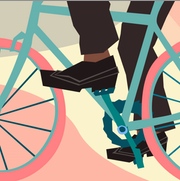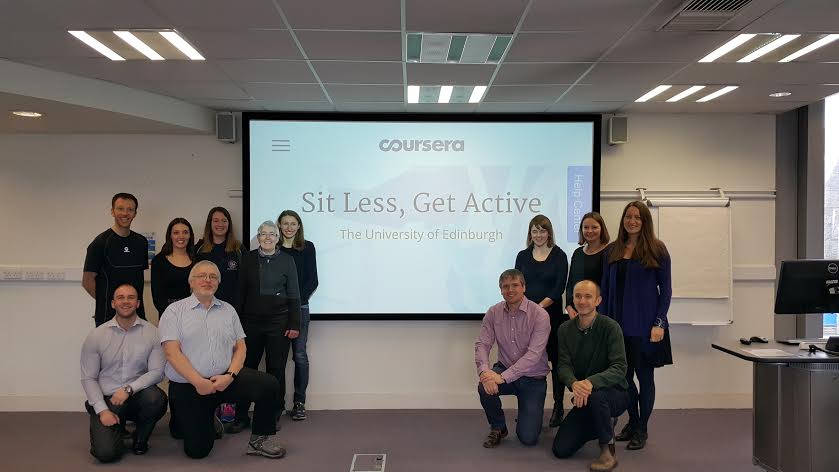By Adam Bleakley (Foundation Doctor, NHS Lothian) and Evan Jenkins (Medical Student, University of Edinburgh)
Physical activity is regarded as a global public health priority (Kohl, 2012), and physical inactivity the biggest public health problem of the 21st century (Blair, 2009).
Physical inactivity and sedentariness, “silent killers”, are associated with increased morbidity and reduced life expectancy (Lee et al. 2012, Levine 2015). Despite this, about one third of the global population are inactive (Hallal et al. 2012). In 2012, almost half of England and Scotland’s population did not meet the physical activity guidelines, and physical activity further decreases with age (British Heart Foundation, 2015).
It is imperative to further promote benefits of physical activity, work on strategies that will increase population levels of physical activity and make it an important part of people’s everyday lives.
 Sit Less, Get Active MOOC
Sit Less, Get Active MOOC
Here, at the University of Edinburgh (Usher Institute for Population Health Sciences and Informatics, Physical Activity for Health Research Centre, Sports and Exercise and School of Informatics), we are the first to offer a “Sit Less, Get Active” Massive Open Online Course (MOOC), on June 30th, 2016. This new, interactive MOOC promotes and evaluates physical activity.
For those thinking, “what’s a MOOC??”: MOOCs are online courses that can be taken by anyone from any part of the world in their own time as long as you have access to the Internet.
Sign up here (it’s that easy): https://www.coursera.org/learn/get-active
Join us on a journey to learn how to sit less and become more active. Use this free course to learn how to monitor your own activity, set physical activity goals and make physical activity a habit- or share it with networks that you think it will benefit. We will present various examples on how to sit less and be more active in various settings such as your neighbourhood, home, work or educational environment, to help you incorporate the ones that fit the best to your lifestyle.
The MOOC is 3 weeks long with a commitment of not more than one hour per week. This course also offers you a unique opportunity to receive weekly physical activity health messages and monthly video reminders for 6 months after the initial 3 week-course as nudges to help you sit less and stay more active.
And if you are a health professional, use knowledge gain through this course to empower your patients to be more physically active. However, if time is the constraint, you can simply “prescribe” the course to your patients.
 The core MOOC team includes (in alphabetical order): Dr Graham Baker, Dr Danijela Gasevic, Professor Dragan Gasevic, Dr Andrew Murray, Professor Nanette Mutrie, Professor Chris Oliver, and Helen Ryall. We are grateful to all volunteers and partners who have advised us, endorsed us or worked with us in many capacities such as The Scottish Government, NHS Health Scotland, NHS Health Lothian, Sustrans Scotland, Edinburgh Leisure, SPORTA, Cycling UK, and Queen Margaret University.
The core MOOC team includes (in alphabetical order): Dr Graham Baker, Dr Danijela Gasevic, Professor Dragan Gasevic, Dr Andrew Murray, Professor Nanette Mutrie, Professor Chris Oliver, and Helen Ryall. We are grateful to all volunteers and partners who have advised us, endorsed us or worked with us in many capacities such as The Scottish Government, NHS Health Scotland, NHS Health Lothian, Sustrans Scotland, Edinburgh Leisure, SPORTA, Cycling UK, and Queen Margaret University.
How to sign up and share
The course starts on June 30, 2016, and it will run three to four times per year. You can sign up to Sit Less, Get Active MOOC by registering online via link: https://www.coursera.org/learn/get-active
Follow us on Twitter @GetActiveMOOC for a daily dose of physical activity promotion. If you have any questions, please contact the Team Lead Dr Danijela Gasevic at danijela.gasevic@ed.ac.uk And don’t forget, Sit Less and Get more active for your health and happiness!
#MOOCGetActive
References:
Blair, SN. Physical inactivity: the biggest public health problem of the 21st century. BJSM 2009: 43:1-2. OPEN ACCESS HERE
British Heart Foundation. Physical Activity Statistics 2015. Accessed at https://www.bhf.org.uk/publications/statistics/physical-activity-statistics-2015 on June 18 2016
Hallal PC, Andersen LB, Guthold R, Haskell W for the Lancet Physical Activity Series Working Group. Global physical activity levels: surveillance progress, pitfalls, and prospects. Lancet 2012;380(9838):247-257.
http://www.thelancet.com/journals/lancet/article/PIIS0140-6736(12)60646-1/abstract
Kohl HW, Craig CL, Lambert EV, Inoue S, Alkandari JR, Leetongin G, Kahlmeier S. The pandemic of physical inactivity: global action for public health. The Lancet, 2012;380(9838):294-305.
Lee I, Shiroma EJ, Lobelo F, Puska P, Blair SN, Katzmarzy PT for the Lancet Physical Activity Series Working Group. Effect of physical inactivity on major non-communicable diseases worldwide: an analysis of burden of disease and life expectancy. Lancet 2012, 380(9838):219-229.
Levine JA. Sick of sitting. Diabetologia 2015, 58(8):1751-1758